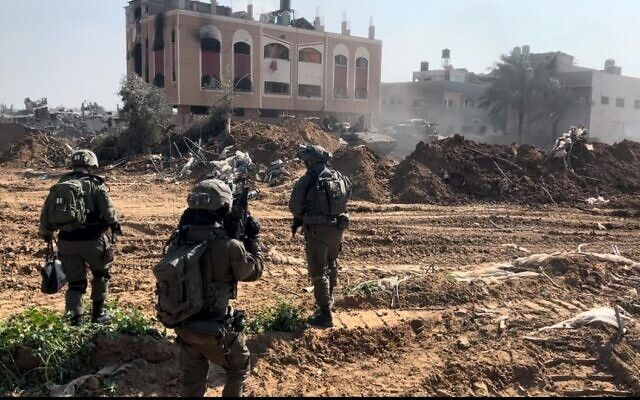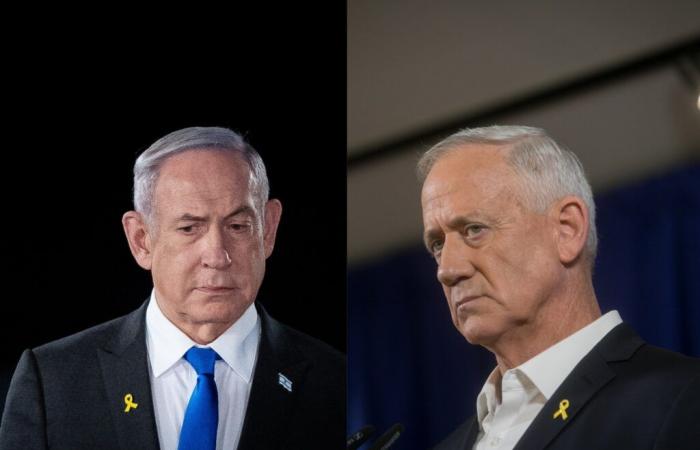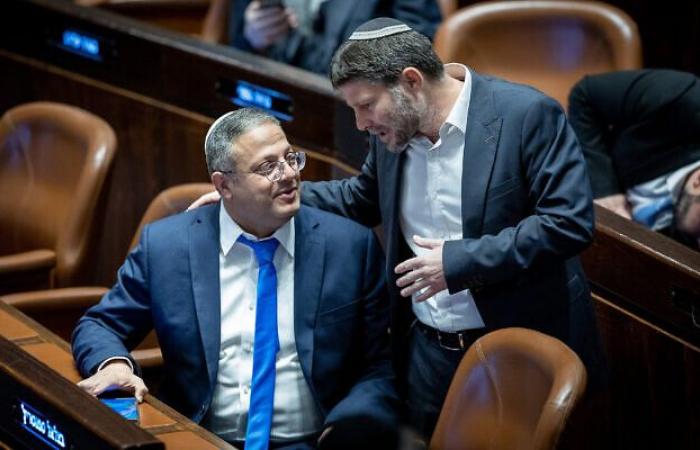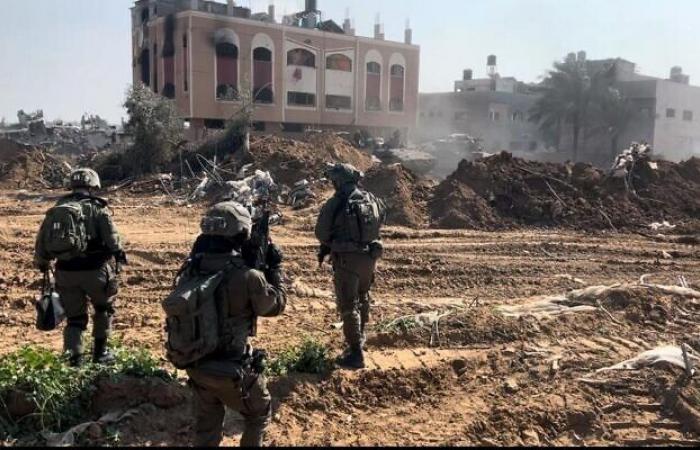An Israeli television channel on Sunday broadcast detailed excerpts of a telephone call that took place last April between Prime Minister Benjamin Netanyahu and Benny Gantz, who was then a minister in the war cabinet. An interview which sheds new light both on the strong tensions which animated the emergency government during this period of war and on the unsuccessful efforts which had been made, at the time, to reach an agreement on the hostages.
According to news channel No. 12, the call took place on April 27 – about six weeks before Gantz left the coalition his party joined at the start of the war. The conversation between the two men followed Netanyahu’s decision to limit the mandate of the Israeli negotiating team responsible for talks with Hamas, discussions conducted through Egypt and Qatar – a decision that the Prime Minister had taken without first consulting Gantz.
As part of the coalition agreement concluded when his HaMahane HaMamlahti party entered the government, it was agreed that Gantz would join the war cabinet, the government military command cell which has now disappeared, alongside Netanyahu and then-Defense Minister Yoav Gallant. To this extent, he had until then been involved in all previous decisions regarding the mandate of the negotiators.
Receive our daily edition for free by email so you don’t miss the best news. Free registration!
This decision to limit the team’s mandate was taken in the context of intensive negotiations for the release of hostages held by Hamas in Gaza. These talks ultimately failed, with the two sides failing to resolve their disagreements on fundamental issues.
According to the channel, several other people took part in the call, including Gallant and Mossad chief David Barnea.
According to the transcript of the conversation which was made public by N 12, Gantz had expressed his anger following these changes in the mandate of the negotiating team without prior consultation with him. He said he suspected the major decision was made following pressure from Netanyahu’s far-right allies, Finance Minister Bezalel Smotrich and National Security Minister Itamar Ben Gvir – who have repeatedly threatened to leave the government if Israel ends its war in the Gaza Strip.
Netanyahu, in response, sought to allay Gantz’s doubts, explaining that the discussion on the team’s mandate took place without having been clearly planned.
“Benny, I want to set the record straight,” he explains in the transcript. “I just wanted to talk to the head of Mossad and the [négociateur] Nitzan Alon because I wanted to make some comments on the text [de l’accord] and confirm certain things with them. But then other people wanted to join the discussion. The Minister of Defense and the Chief of Staff wanted to join the discussion.”
Prime Minister Benjamin Netanyahu, Defense Minister Yoav Gallant and Minister Benny Gantz during a press conference at the Defense Ministry, in Tel Aviv, December 16, 2023. (Noam Revkin Fenton/Flash90)
“I had nothing against the fact that you intervened, you should have done it, there is no doubt,” continues the Prime Minister. “We are not hiding anything. I would have had no problem with you intervening and I am sure you would have agreed with everything that was said in these exchanges.”
Asked by Gantz what exactly he wanted to re-examine, Netanyahu replied that he “wanted to resolve certain things, like how we could motivate Hamas to return hostages to us without committing up front that the IDF leaves the Gaza Strip.
The prime minister also denies revealing the details in the proposed deal to Smotrich, telling Gantz that he “got them from someone else, not me.”
“You think he came to me and I gave him details, which is not true,” Netanyahu insists. “I didn’t give him any details. I was there with [le secrétaire du cabinet Yossi] Fuchs, and it was a meeting that was supposed to last five minutes. He came to talk to me about something else, we didn’t say a word about the agreement.”
Part of the call was banned from publication by military censors – Mossad chief David Barnea, who was taking part in the call, confided to Gantz the details of decisions that had been made the night before. The news channel, however, reported that the meeting focused in part on the decision to require Hamas to release 33 hostages on humanitarian grounds in the first phase of a deal, whatever ‘it be.
Far-right ministers Itamar Ben Gvir and Bezalel Smotrich, in the Knesset on December 29, 2022. (Credit: Yonatan Sindel/Flash90)
“So we asked for a quick meeting to discuss the issue, and everyone who joined us was able to discuss it,” Netanyahu told Gantz, according to the transcript. “I am convinced that if you had been there, you would have agreed too because everyone else did.”
Gantz, in response, warned the prime minister that the war cabinet was not a mere decoration that would be easy to ignore.
“I told you during the discussion that I insisted on the need for things to be clearly understood, because every time we found agreement on an issue – and check it yourself, Mr. Prime Minister – during all the previous discussions, each time we reached an agreement, the next day we found the same issue postponed or moved elsewhere, each time under a different pretext, even if that pretext was justified,” Gantz rages at course of the conversation. “Ultimately, every decision we may have made in the war cabinet has been changed or delayed and that is something I cannot accept.”
“You are the Prime Minister, the ultimate responsibility lies with you,” adds Gantz, who then recalls that “we both know that 16 people have been murdered since December.”
“We don’t know how important each passing moment is… Each passing day, each delay can cost human lives. We procrastinate over and over again, and I’m sure that’s not what you want and I don’t want it either… But at the end of the day, it puts the hostages in danger,” he continues.
“I repeat: if the war cabinet is, in your opinion, a dead weight, then it must be dissolved and you must say so. Otherwise, respect it and if a decision is made, I must not receive information the next morning that indicates that things have changed again.”
He notes that it seems to him that the “half hour Netanyahu spent with Smotrich was, in the end, more important than the war cabinet meeting.”
Gantz also expresses fear that with Israel’s demands in the talks, Hamas will not even agree to sit at the negotiating table.
Netanyahu then retorts that Hamas benefits from “very favorable opening conditions” and that it has no reason not to participate in the discussions.
“We must obtain the best possible opening conditions,” recognizes Gantz, “provided that the professionals, and you too, can confirm that Hamas will indeed come to the negotiating table because if it does not do so, things will hang around for another week. And during this week, I don’t know how many more hostages we can lose. If we don’t trust the team [de négociation]let’s send someone else. I personally don’t see a problem with it.”
The conversation then returns to the subject of Smotrich and Ben Gvir, noted channel N 12, while Gallant, who has been silently listening to the call until then, suggests that the one who revealed the broad outlines of the proposal submitted to the two parties “do not want to conclude an agreement”.
The return of the hostages “is also one of the objectives of the war, and if they are not alive, we will not achieve it”, adds Gallant.
Gallant, who was fired by Netanyahu as defense minister earlier this month, later said he wanted the war to be managed only by the war cabinet, not members of the security cabinet.

Soldiers of the Tzabar Battalion operating in the central Gaza Strip, February 25, 2024. (Lazar Berman/Times of Israel)
“The management of the war falls within the exclusive competence of the cabinet [de guerre] “, he declares. “The prime minister is the most important person here, but he is not alone.”
“I know there are people who don’t want a deal,” Gantz told Gallant. “I know some people are taking advantage of the current adversity, and I personally want no part of it.”
The report noted that while Hamas initially reacted positively to the offer presented to it – which included releases of hostages in several phases and a gradual withdrawal of Israeli soldiers from the Gaza Strip – Netanyahu was quick to declare to the media that Israel would be able to resume fighting after the implementation of the first phase, thus avoiding ending the war. Critics then accused the prime minister of undermining the negotiations through his statements, as well as his subsequent insistence on adding demands to the finalization of an agreement – notably regarding the continued Israeli presence on the border separating Gaza and Egypt as part of any arrangement.
Gantz and his party, HaMahane HaMamlahti, ended up leaving the coalition in June, deploring “the lack of clear direction in the management of the war” and accusing the Prime Minister of being indebted to the far right which, for its part, seeks to continue the fighting and even hopes to eventually be able to rebuild Israeli settlements within the coastal enclave.
The Prime Minister’s Office rejected the report which was broadcast by N 12, saying that “once again, certain elements in Israel are echoing Hamas propaganda, propaganda which aims to place all responsibility on the prime minister, even as a number of US officials have made it clear that Hamas was behind the failure to finalize a new hostage deal” after a week-long truce that took place at the end of the month last November – 105 captives were released from the terrorist group’s jails on this occasion.
For its part, Gallant’s office said it would not comment on the content of a classified top-secret security discussion, as such comments “harm the achievement of the objectives of the war.”
“We suggest to the opposition members who are responsible to put an end to such leaks,” the statement added.
Finally, for his part, Gantz reacted to the report by condemning the continued leaking of sensitive conversations and once again called for the creation of a national commission of inquiry to examine the failures that surrounded the pogrom of October 7 and the war in Gaza that followed the massacre.
A state commission of inquiry, Gantz said, is the only way “to bring the truth to the public about the decision-making process and it’s the only way to provide answers as to who pushed for hostage release and offensive operations, and who hesitated, feared, and acted on the whims and approvals of his coalition partners.”








